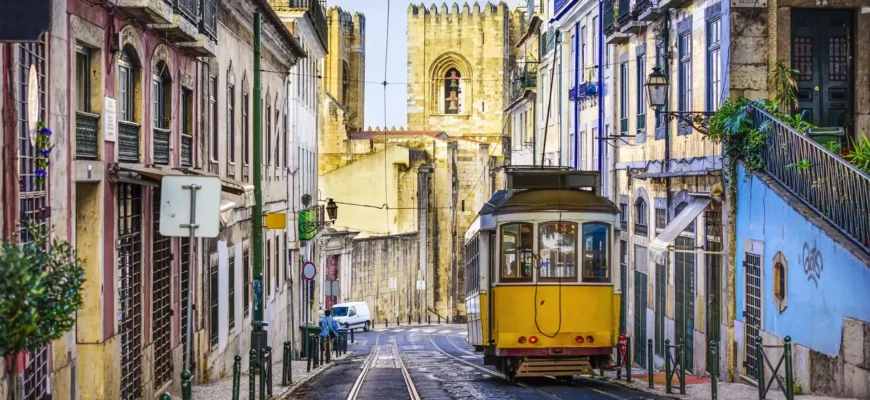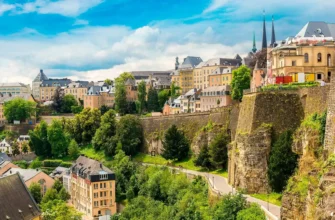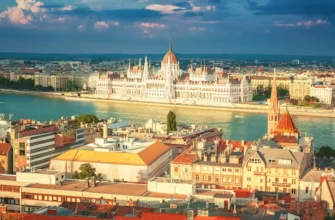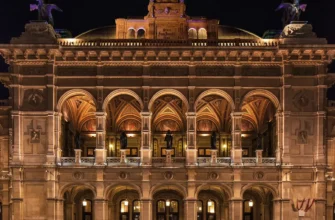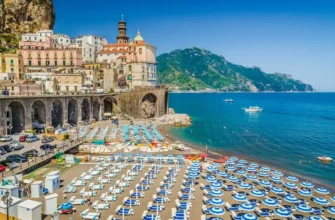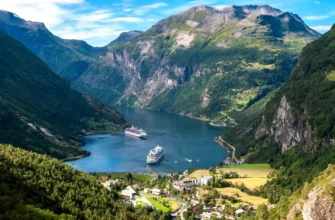1. Geographic Location
Lisbon, the capital city of Portugal, sits along the western edge of the Iberian Peninsula, where the Tagus River meets the Atlantic Ocean. This unique geographical position has shaped Lisbon’s identity as a key maritime hub, offering stunning coastal views and a mild Mediterranean climate. The city is spread across seven hills, giving it a unique and picturesque landscape filled with steep streets, historic neighborhoods, and panoramic viewpoints called “miradouros.” Lisbon’s proximity to the Atlantic has also contributed to its long history of exploration and trade, making it a natural gateway to the world.
2. Historical Overview
Lisbon’s history stretches back over 2,000 years, with the city having been occupied by a variety of civilizations, including the Phoenicians, Romans, Moors, and eventually the Portuguese. The city’s strategic location on the coast made it a vital part of maritime trade routes.
One of the most significant moments in Lisbon’s history was during the Age of Discoveries in the 15th and 16th centuries. Portuguese explorers, such as Vasco da Gama, set sail from Lisbon, opening new sea routes to Africa, Asia, and the Americas, which helped establish Portugal as a major colonial power. The city flourished during this period, becoming one of the wealthiest capitals in Europe.
However, in 1755, Lisbon experienced one of the most devastating earthquakes in recorded history, which, along with the subsequent fires and tsunamis, destroyed much of the city. The Marquis of Pombal, a prominent Portuguese statesman, led the rebuilding effort, creating the downtown Baixa district, which remains a symbol of Lisbon’s resilience and architectural beauty.
Lisbon continued to play a pivotal role in Portugal’s history through the 20th century, including during the Carnation Revolution of 1974, which ended nearly five decades of dictatorship and restored democracy to the country.

3. Visual Appeal and Cultural Value
Lisbon is a city that enchants visitors with its blend of old-world charm and vibrant modern culture. The city’s iconic landmarks tell the story of its rich history and artistic heritage.
- Belém Tower: This UNESCO World Heritage site, built in the early 16th century, was part of the defense system that protected the city from invaders and also served as a departure point for explorers.
- Jerónimos Monastery: Another UNESCO site, this masterpiece of Manueline architecture is a testament to the wealth that Lisbon accumulated during the Age of Discoveries.
- Praça do Comércio: A grand plaza by the river that serves as a reminder of Lisbon’s maritime past and offers stunning views of the Tagus River.
The Alfama district, with its narrow, winding streets, is one of the oldest parts of the city and offers a glimpse into Lisbon’s Moorish past. Here, visitors can experience the soulful sounds of fado, a traditional form of Portuguese music that has been recognized by UNESCO as Intangible Cultural Heritage.
In contrast, modern areas like the Parque das Nações, developed for Expo 98, showcase Lisbon’s contemporary side with sleek architecture, vibrant nightlife, and cultural attractions such as the Oceanário de Lisboa, one of the largest aquariums in the world.
Lisbon is also known for its distinctive tiled facades, known as azulejos, which adorn many buildings, and its rich culinary culture, including pastéis de nata (custard tarts) and fresh seafood.
4. Tourism Statistics
Lisbon has seen a significant increase in tourism over the past decade, becoming one of the most popular European capitals for travelers. In 2023, the city welcomed over 7 million tourists, drawn by its warm climate, historic attractions, and vibrant culture. Key events such as Web Summit, the largest tech conference in the world, and the Lisbon & Sintra Film Festival have further boosted international interest in the city.
Additionally, the city’s hosting of Lisbon Pride and numerous music festivals have made it a year-round destination for visitors seeking both cultural and entertainment experiences.
5. Environmental Challenges
Like many global cities, Lisbon faces environmental challenges, particularly concerning rising sea levels due to climate change, which poses a risk to its coastal areas. The city has implemented several sustainability initiatives, including the expansion of green spaces and the promotion of electric public transportation, such as the Carris electric buses and trams. Lisbon was named the European Green Capital 2020, recognizing its efforts to improve urban sustainability, reduce carbon emissions, and promote environmental awareness.
Conclusion:
Lisbon is a city where history, culture, and modernity blend seamlessly. From its iconic landmarks like Belém Tower to the soulful music of fado in Alfama, Lisbon offers a wealth of experiences for visitors. As it continues to address environmental challenges and embrace sustainability, Lisbon is not just a window into the past but also a model for the future.

Visitor Reviews: Exploring Lisbon (Portugal)
Lisbon, Portugal’s charming capital, is a city known for its blend of historic grandeur, vibrant culture, and picturesque landscapes. Visitors flock to experience its unique attractions, from ancient monuments to modern-day wonders. But what do travelers have to say about their experiences? Below are the top positive and negative reviews from those who have experienced the city firsthand.
Top 3 Positive Reviews
- “A Perfect Blend of History and Modernity!” – 5 stars
“Lisbon absolutely stole my heart! The combination of rich history and modern vibrancy is amazing. Walking through the Alfama district felt like stepping back in time, with its winding streets and fado music filling the air. Belém Tower and Jerónimos Monastery were even more impressive in person—both are must-sees for any history lover. I also enjoyed the city’s contemporary side at the Parque das Nações. The food was another highlight; I had the best seafood of my life here! Lisbon is a city full of surprises and charm. I can’t wait to come back!” - “Incredible Views and Culture Everywhere!” – 5 stars
“Lisbon’s beauty is unmatched! The city is spread across seven hills, and each offers breathtaking views of the Tagus River and the colorful rooftops. I spent hours just wandering from one miradouro (viewpoint) to the next, and every turn led to another stunning sight. The azulejos (tiles) that cover the buildings are so unique and make the streets vibrant. Don’t miss a ride on Tram 28—it’s the best way to explore the city and its historical districts. Lisbon is a photographer’s dream and a cultural haven!” - “Fado, Food, and Fantastic People!” – 5 stars
“The soul of Lisbon is in its culture, and I felt it everywhere I went. One evening, I experienced fado music in a small, cozy restaurant in Alfama. The singers’ voices were so powerful and emotional that it gave me goosebumps. The city is also a food paradise. From pastéis de nata to bacalhau (salted cod), every meal was a delight. And the people were so warm and welcoming, always eager to share their love for the city. Lisbon made me feel right at home, and I’ll be telling everyone to visit!”
Top 3 Negative Reviews
- “Beautiful but Overcrowded” – 3 stars
“Lisbon is beautiful, but I wasn’t prepared for how crowded it would be. We visited in the summer, and the major attractions like Belém Tower and Praça do Comércio were packed with tourists. It was hard to enjoy the sites when we were constantly surrounded by crowds, and there were long lines for almost everything. I also found that some areas, like Alfama, were difficult to navigate because of the narrow streets, especially when they were full of visitors. I’d recommend visiting during the off-season if you want a quieter experience.” - “Lovely City, But Watch Your Budget!” – 2 stars
“While Lisbon is undoubtedly a beautiful and culturally rich city, it wasn’t as affordable as I had hoped. Prices for accommodation and dining were higher than expected, especially in the touristy areas. We ended up spending more than we planned just for basic meals and transportation. The cost of entry for some attractions was also on the steep side, considering what you get. I’d recommend researching budget options before arriving, especially if you’re trying to avoid expensive tourist traps.” - “Too Much Walking and Hills!” – 3 stars
“Lisbon is a stunning city, but be prepared for a lot of walking, especially uphill! The city’s seven hills make it tough to navigate if you’re not in good shape or have mobility issues. I was excited to explore, but after a few days, all the steep streets started to wear me down. The tram system is charming, but sometimes it’s overcrowded or not reliable enough. While I loved the sights and culture, the physical effort required to get around took away from the enjoyment at times. If you’re not up for constant climbing, Lisbon might not be the city for you.”
Conclusion:
Lisbon has captivated many visitors with its stunning views, rich culture, and historic landmarks, but like any major destination, it has its challenges. Some travelers were overwhelmed by the summer crowds and the hilly terrain, while others found the costs higher than anticipated. However, for most, the beauty and unique experiences in Lisbon far outweighed any minor inconveniences, making it a destination worth visiting for its charm, culture, and unforgettable moments.

Key Recent and Upcoming Events in Lisbon (Portugal)
Lisbon is a city that thrives on culture, history, and celebration, with events that attract both locals and visitors from around the globe. From music festivals to tech conferences, the city has hosted a range of significant events in recent years and continues to offer exciting upcoming experiences. Below is an overview of Lisbon’s recent major events and a guide to what’s happening in the next 12 months.
1. Recent Significant Events
Web Summit 2023
One of the largest tech conferences in the world, Web Summit returned to Lisbon in November 2023, drawing over 70,000 attendees from around the globe. The event featured tech leaders, startups, and innovators from various industries, showcasing the latest in technology and innovation. It has become a key annual event for the city, positioning Lisbon as a global hub for technology and entrepreneurship. Notable speakers included high-profile CEOs, politicians, and celebrities who shared insights on the future of tech, sustainability, and global challenges. The conference’s international reach continues to bring global attention to Lisbon.
Lisbon Pride 2023
In June 2023, Lisbon Pride filled the streets with a vibrant celebration of diversity and inclusivity. The event, also known as Arraial Lisboa Pride, took place in Praça do Comércio, one of the city’s most iconic squares. With a mix of concerts, parades, and community activities, Lisbon Pride drew thousands of participants, making it one of the most significant Pride events in Southern Europe. The event celebrated LGBTQ+ rights and inclusion, with a friendly and welcoming atmosphere that highlighted Lisbon’s reputation as a progressive and open-minded city.
Lisbon & Sintra Film Festival 2022
The Lisbon & Sintra Film Festival (LEFFEST) returned in 2022 with a stellar lineup of films, directors, and actors from around the world. The event took place in Lisbon and Sintra and featured screenings of independent and avant-garde films, along with discussions, workshops, and special appearances by renowned filmmakers. The festival’s international reputation for showcasing bold and innovative cinema made it a key cultural event for both film enthusiasts and industry professionals. Highlights included retrospectives on acclaimed directors and premieres of cutting-edge films that challenged artistic boundaries.
2. Upcoming Events
Rock in Rio Lisboa 2024
Set to take place in June 2024, Rock in Rio Lisboa is one of the most anticipated music festivals in Europe. Held every two years at Parque da Bela Vista, this event attracts some of the world’s biggest musical acts across various genres, from rock to pop and electronic music. Past performers have included major names like Foo Fighters, The Black Eyed Peas, and Post Malone. The festival offers not only music but also a wide range of activities, including food stalls, games, and interactive experiences. For music lovers, Rock in Rio Lisboa is an unforgettable experience where they can enjoy top-tier performances in one of Lisbon’s largest parks.
Lisbon Book Fair 2024
Bookworms won’t want to miss the Lisbon Book Fair, which will be held in Eduardo VII Park in May 2024. This annual event is one of the oldest and largest book fairs in Portugal, featuring a vast array of books from national and international publishers. In addition to book signings and readings from renowned authors, the fair hosts discussions on literature, culture, and society. It’s an excellent opportunity for visitors to explore Portuguese literary culture and pick up some unique finds. The fair also offers activities for children, making it a family-friendly event.
Web Summit 2024
Scheduled for November 2024, Web Summit will once again bring together tech enthusiasts and entrepreneurs in Lisbon for a week of networking, innovation, and inspiration. With more than 1,000 speakers, 1,500 startups, and thousands of attendees, Web Summit is the place to be for those interested in the latest tech trends. The event is not just for tech professionals; it’s a global gathering that attracts people from various fields, including politics, entertainment, and media. Attendees can participate in keynote speeches, panel discussions, and hands-on workshops, all while exploring Lisbon’s vibrant city life.
Lisbon Marathon 2024
For fitness enthusiasts, the Lisbon Marathon will take place in October 2024. Known for its scenic route along the Tagus River and through the city’s historic districts, this marathon is a fantastic way to experience Lisbon while testing your endurance. The event also includes a half marathon and a mini marathon, catering to runners of all levels. Participants can enjoy breathtaking views of Lisbon’s architecture and waterfront while engaging in one of the most physically challenging and rewarding experiences the city offers.
Lisbon Ocean Week 2024
Celebrating Portugal’s close ties to the sea, Lisbon Ocean Week will take place in July 2024. This event focuses on raising awareness about ocean conservation and sustainability. The week includes conferences, exhibitions, and community initiatives aimed at protecting marine ecosystems. As Lisbon continues to position itself as a leader in environmental sustainability, this event is a perfect opportunity for visitors to learn more about global efforts to preserve our oceans while enjoying the city’s beautiful coastal scenery.

Conclusion:
Lisbon’s event calendar is packed with exciting cultural, technological, and environmental activities that make it a dynamic destination year-round. Whether you’re into music festivals like Rock in Rio Lisboa, looking to attend global tech events like Web Summit, or interested in celebrating the arts and culture at the Lisbon Book Fair, there’s something for everyone. Visitors can not only enjoy these events but also immerse themselves in the city’s history, food, and vibrant atmosphere.
So, mark your calendars and get ready to participate in Lisbon’s upcoming events—there’s no better way to experience the heartbeat of Portugal’s capital!
Travel Tips for Visiting Lisbon, Portugal
Lisbon is a city that dazzles visitors with its mix of historical landmarks, vibrant neighborhoods, and stunning coastal views. To make the most of your trip to Portugal’s capital, it’s essential to prepare in advance. Here are some key travel tips to ensure a smooth and enjoyable visit to Lisbon.
1. Pre-Travel Preparation
Packing for Lisbon
Lisbon enjoys a Mediterranean climate, with hot summers and mild winters, but the weather can change quickly, so it’s important to pack accordingly:
- Comfortable shoes: Lisbon is known for its hilly terrain and cobblestone streets. You’ll be doing a lot of walking, so bring sturdy, comfortable shoes.
- Light clothing and layers: Summers in Lisbon can get hot (sometimes reaching over 30°C), so pack light clothing, but bring a few layers for cooler evenings. If you’re visiting in winter, it’s generally mild (10-15°C), but pack a jacket to stay warm in the evenings.
- Sun protection: Lisbon is sunny most of the year, so bring sunscreen, sunglasses, and a hat to protect yourself during outdoor activities.
- Reusable water bottle: Stay hydrated while walking the city’s streets, and refill at the many public fountains.
- Plug adapter: Portugal uses type C and F plugs, so bring an adapter if necessary.
Documents and Essentials
- Passport and visa: Ensure your passport is valid for at least six months beyond your trip. If you’re from the EU, US, or many other countries, you won’t need a visa for stays of up to 90 days, but check your country’s requirements.
- Health insurance: Consider travel insurance, especially for any medical emergencies.
- Currency: Portugal uses the Euro (€). Credit cards are widely accepted, but it’s always good to have some cash for small purchases, particularly in local markets.
2. What to Watch Out For
Navigating Lisbon
Lisbon’s public transportation system is efficient and easy to use, making it a great way to explore the city:
- Trams and buses: The iconic yellow Tram 28 is both a tourist attraction and a convenient way to explore the city’s historic neighborhoods like Alfama and Bairro Alto. However, it can get crowded, so try to ride it early in the morning or late in the evening.
- Metro: Lisbon’s metro system is fast and affordable, connecting key points across the city. Consider getting a Lisboa Card, which offers unlimited travel on public transport and discounts to many attractions.
- Walking: Lisbon is a walkable city, but be prepared for steep hills and cobblestones. The neighborhoods are compact, and walking is often the best way to soak in the atmosphere of places like Baixa and Chiado.
Avoiding Tourist Traps
While Lisbon is a relatively affordable European destination, there are a few tourist traps to avoid:
- Restaurants in touristy areas: Avoid dining in the main squares like Praça do Comércio or by the riverfront, where prices can be inflated. Instead, seek out local tascas (small, family-owned restaurants) in quieter neighborhoods for authentic Portuguese cuisine at reasonable prices.
- Pickpockets: While Lisbon is a safe city, pickpocketing can be an issue, especially in crowded areas like Rossio Square and on Tram 28. Keep your belongings secure and be aware of your surroundings.
- Fado shows: Fado music is an essential part of Lisbon’s culture, but some tourist-targeted performances can be overpriced. For an authentic experience, visit a smaller fado house in Alfama or Bairro Alto.

3. Challenges and Dangers
Crowds
During peak tourist season (June to September), Lisbon’s main attractions like Belém Tower, Jerónimos Monastery, and the Castelo de São Jorge can get very crowded. To avoid the worst of the crowds:
- Visit early in the morning or late in the afternoon to avoid long queues and packed sites.
- Explore lesser-known neighborhoods like Graça and Campo de Ourique for a more relaxed experience.
Weather
Lisbon enjoys mild winters, but summer temperatures can soar, especially in August. If you’re visiting during the summer, be prepared for:
- Hot weather: Stay hydrated, wear light clothing, and take breaks in shaded areas or indoor attractions.
- Sunburn: Lisbon is sunny almost year-round, so don’t forget to apply sunscreen regularly, especially when sightseeing for extended periods.
Local Customs
The Portuguese are generally laid-back and friendly, but here are a few customs to keep in mind:
- Tipping: Tipping is not obligatory, but rounding up the bill or leaving 5-10% for good service is appreciated.
- Respect for local culture: In churches and religious sites, be respectful by dressing modestly and keeping noise levels low.
- Language: While English is widely spoken, especially in tourist areas, learning a few basic Portuguese phrases can be helpful and appreciated by locals.
4. Advance Booking Advice
Accommodations
Lisbon’s popularity as a tourist destination has grown rapidly, so booking accommodations in advance is highly recommended, especially during peak season. Consider the following:
- Popular neighborhoods: Bairro Alto and Alfama are great for nightlife and history, while Baixa and Chiado are central and close to major attractions. However, if you prefer a quieter stay, consider staying in residential areas like Lapa or Principe Real.
- Book at least 2-3 months in advance if you’re visiting during peak season to secure the best rates.
Transportation
- Airport transfers: Lisbon’s Humberto Delgado Airport is located about 7 km from the city center. Taxis and rideshares are available, but consider pre-booking an Aerobus shuttle or arranging a transfer with your hotel for convenience.
- Train tickets: If you’re planning day trips outside of Lisbon (such as to Sintra or Cascais), it’s a good idea to book train tickets in advance to ensure availability, especially on weekends.
Conclusion:
A trip to Lisbon offers a perfect mix of historic charm, modern culture, and beautiful scenery. By packing smart, navigating the city efficiently, and booking accommodations and transportation in advance, you can enjoy all that Lisbon has to offer with ease. Whether you’re admiring the azulejos, enjoying the views from a miradouro, or indulging in pastéis de nata, Lisbon is sure to leave you with unforgettable memories.
What’s Next After Visiting Lisbon, Portugal?
So, you’ve explored the cobbled streets of Alfama, marveled at the Belém Tower, and indulged in the delicious pastéis de nata. But your Portuguese adventure doesn’t have to end in Lisbon. Just beyond the city, within a 50-kilometer radius, lie stunning destinations perfect for a day trip. Whether you’re looking for picturesque beaches, historic castles, or lush forests, here are the top spots to visit after your time in Lisbon.
1. What’s Next After Lisbon? Top Day-Trip Destinations
1. Sintra (29 km from Lisbon)
One of the most popular day trips from Lisbon, Sintra is a fairytale-like town nestled in the lush hills of the Sintra-Cascais Natural Park. Sintra is home to some of Portugal’s most stunning palaces and castles, including:
- Pena Palace: This brightly colored palace looks straight out of a storybook, with its whimsical design and stunning views of the surrounding forest.
- Quinta da Regaleira: Explore the mysterious gardens and the Initiation Well, a spiral staircase that descends into the earth like something out of a fantasy novel.
- Moorish Castle: Perched on the hilltop, this ancient fortress offers panoramic views of Sintra and the Atlantic Ocean.
Visitors can reach Sintra easily by train from Lisbon in just 40 minutes, making it an ideal day trip for history lovers and nature enthusiasts alike.
2. Cascais (30 km from Lisbon)
If you’re craving some sun and sea after your time in Lisbon, head to Cascais, a charming seaside town just 30 minutes from the capital. Cascais is known for its beautiful beaches, historic buildings, and relaxed atmosphere. Here’s what you can do in Cascais:
- Relax on the beach: Praia da Rainha and Praia da Conceição are two of the best beaches in Cascais, offering golden sands and clear waters.
- Explore the Old Town: Stroll through Cascais’ historic center, where you’ll find quaint streets, colorful buildings, and plenty of local shops and cafés.
- Visit Boca do Inferno: A dramatic cliff formation where waves crash against the rocks, creating spectacular sights.
Cascais is perfect for a laid-back day trip, whether you want to soak up the sun or enjoy a leisurely meal by the sea.

3. Estoril (25 km from Lisbon)
Just a stone’s throw from Cascais is Estoril, another coastal town known for its glamorous past and beautiful beaches. Estoril is home to Europe’s largest casino, the Casino Estoril, which is said to have inspired Ian Fleming’s James Bond novel Casino Royale. In Estoril, you can:
- Try your luck at the Casino Estoril: Even if you’re not into gambling, the casino is worth visiting for its impressive architecture and cultural performances.
- Relax at Tamariz Beach: A short walk from the casino, Tamariz Beach offers calm waters and plenty of beachside restaurants where you can enjoy a drink with a view.
- Walk along the coast: The seaside promenade connecting Estoril and Cascais offers stunning views of the Atlantic Ocean and is perfect for a leisurely walk.
4. Queluz (15 km from Lisbon)
If you’re interested in exploring another grand palace, head to Queluz, home to the Palácio Nacional de Queluz. Often compared to Versailles, this 18th-century palace is one of Portugal’s most impressive examples of Rococo architecture. Highlights include:
- Stunning gardens: The palace gardens feature intricate fountains, statues, and hedges, perfect for a peaceful stroll.
- Royal interiors: Tour the lavish rooms of the palace, including the stunning Throne Room and the Queen’s Apartments.
Queluz is only a 20-minute drive from Lisbon and offers a quieter, less-crowded alternative to Sintra’s more famous palaces.
5. Arrábida Natural Park (40 km from Lisbon)
For those seeking nature and adventure, Arrábida Natural Park is an excellent option. Located just south of Lisbon, this protected area is known for its dramatic limestone cliffs, lush greenery, and pristine beaches. Top activities in Arrábida include:
- Hiking: Explore the park’s many trails that wind through forests and offer stunning views of the Atlantic coastline.
- Beaches: Praia da Figueirinha and Praia de Galápos are two of the park’s most beautiful beaches, perfect for a relaxing day by the water.
- Wine tasting: The nearby town of Azeitão is known for its wine production. Stop by a local vineyard to sample some of Portugal’s finest wines, including the famous Moscatel de Setúbal.
Arrábida is ideal for outdoor enthusiasts looking to escape the city and immerse themselves in nature.
2. Engage Readers: Share Your Experience and Plan Your Next Trip
What did you enjoy most about your visit to Lisbon? Whether it was the vibrant neighborhoods, historical landmarks, or mouth-watering cuisine, we’d love to hear your stories! Share your experiences with us and help inspire fellow travelers who are planning their Lisbon adventures.
Already dreaming of your next trip? Portugal has so much more to offer beyond Lisbon, from the palaces of Sintra to the beaches of Cascais and the natural beauty of Arrábida. Whether you’re a history buff, a beach lover, or a nature enthusiast, there’s a perfect day-trip destination just waiting to be explored.
Start planning your next adventure today and discover the incredible places just a short journey from Lisbon!
Lisbon’s surrounding areas are rich with history, culture, and natural beauty, making them perfect for day trips. From the fairytale palaces of Sintra to the serene beaches of Cascais, there’s no shortage of adventures waiting for you just beyond the city limits. So, pack your bags, share your travel stories, and get ready to explore the beauty of Portugal beyond Lisbon!


